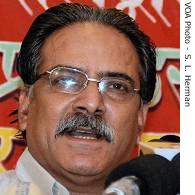-
(单词翻译:双击或拖选)
Kathmandu
16 April 2007
The leader of Nepal's Maoists, who joined the interim1 government earlier this month, has called for the nation to be declared a republic ahead of elections, which are likely to be delayed. But the rebel leader, who goes by the name, Prachanda, promises the former rebels will seek King Gyanendra's removal through the democratic process, at least for now. VOA's Steve Herman reports from Kathmandu.

Nepal's Maoist leader Prachanda during today's news conference, in Kathmandu, 16 Apr 2007
Nepal's Maoists on Monday said they would agree to a delay of nationwide elections if Nepal is declared a republic.
Elections for a constituent2 assembly had been scheduled for June 20.
The new legislators are to decide the fate of Nepal's unpopular monarchy4.
Speaking to reporters at a Kathmandu hotel Monday, Maoist leader Prachanda appealed for the interim parliament to declare the country a republic.
"If it is not going to happen, if other parties will not agree then there are some other options. The referendum may be another option - a most democratic option," he said. "Even if it is also not agreed then we should have to go among the masses. We shall have to appeal to the masses to rouse again against this feudal5 system"
A peace deal last year brought the Maoists into the political process after a decade long insurgency6 that claimed 14,000 lives.
The former rebels agreed to enter the interim coalition7 government if elections were held in June.
Nepal's election commission says nationwide polling can not take place that soon because of technical and security problems. The government has not set a new election date.
King Gyanendra gave up absolute power last year following demonstrations8 organized by the political mainstream9 and the Maoists.
Prachanda on Tuesday rejected speculation10 that the king would be allowed to remain as a ceremonial figure. He said the position the Maoists once took to allow a constitutional monarch3 was the biggest mistake they ever made. He said the Maoists have brought the unpopular king to his knees and they will not back off their hard line anti-royalist position.
 收听单词发音
收听单词发音
1
interim

|
|
| adj.暂时的,临时的;n.间歇,过渡期间 | |
参考例句: |
|
|
|
2
constituent

|
|
| n.选民;成分,组分;adj.组成的,构成的 | |
参考例句: |
|
|
|
3
monarch

|
|
| n.帝王,君主,最高统治者 | |
参考例句: |
|
|
|
4
monarchy

|
|
| n.君主,最高统治者;君主政体,君主国 | |
参考例句: |
|
|
|
5
feudal

|
|
| adj.封建的,封地的,领地的 | |
参考例句: |
|
|
|
6
insurgency

|
|
| n.起义;暴动;叛变 | |
参考例句: |
|
|
|
7
coalition

|
|
| n.结合体,同盟,结合,联合 | |
参考例句: |
|
|
|
8
demonstrations

|
|
| 证明( demonstration的名词复数 ); 表明; 表达; 游行示威 | |
参考例句: |
|
|
|
9
mainstream

|
|
| n.(思想或行为的)主流;adj.主流的 | |
参考例句: |
|
|
|
10
speculation

|
|
| n.思索,沉思;猜测;投机 | |
参考例句: |
|
|
|















